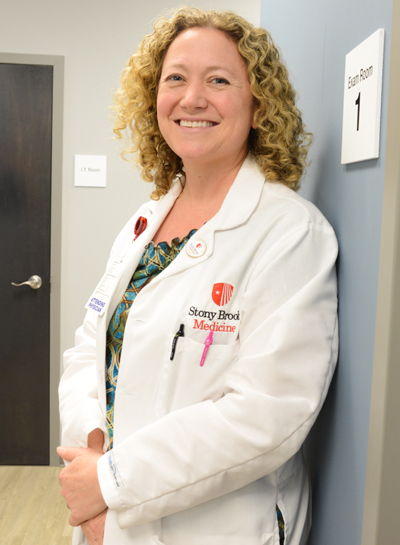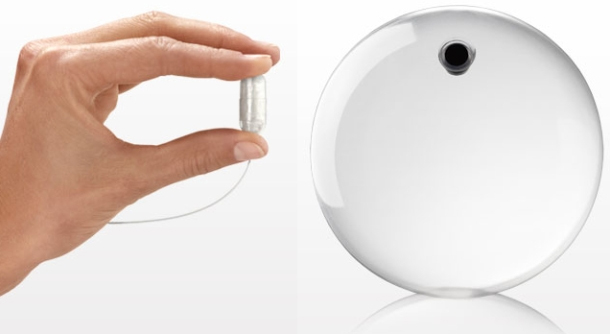NEW BALLOON PILL HELPS PATIENTS LOSE NEARLY TWICE AS MUCH WEIGHT
Data from Multicenter Clinical Trial Shows Major Benefits of Obalon Balloon Therapy
STONY BROOK, NY, November 4, 2016 — Patients with obesity who swallowed gas-filled balloon pills designed to help them eat less lost 1.9 times more weight than patients who relied on diet, exercise, and lifestyle therapy alone, according to new research presented today at ObesityWeek 2016, the largest international event focused on the basic science, clinical application, and prevention and treatment of obesity.
The annual conference is hosted by the American Society for Metabolic and Bariatric Surgery (ASMBS) and The Obesity Society.
Aurora D. Pryor, MD, professor of surgery and vice chair for clinical affairs, and chief of our Bariatric, Foregut, and Advanced Gastrointestinal Surgery Division, is the lead author of the national multicenter study titled "A 6-Month Swallowable Balloon System Results in Sustainable Weight Loss at 1 Year: Results from a Prospective, Randomized Sham-Controlled Trial" (abstract).
"The significant weight loss achieved with the Obalon 6-month balloon system is maintained at 12 months," says Dr. Pryor. "This combination of lifestyle modification and balloon therapy provides a new low-risk option with patients struggling with obesity."
New balloon pill helps patients lose nearly twice as much weight
than diet, exercise, and lifestyle therapy alone.
The Obalon 6-month balloon system, a swallowable intragastric balloon for weight loss in adults with obesity for whom diet and exercise has failed, was approved in September by the U.S. Food and Drug Administration (read about it).
It involves a balloon contained within a capsule that, once it reaches the stomach, is inflated with gas via a microcatheter. Up to three capsules may be taken over three months, but the entire treatment period lasts six months. The inflated balloons make patients feel full. Treatment is accompanied by a moderate intensity diet and behavior modification program. The device is manufactured by Obalon Therapeutics.
Results of the study were based on a randomized, sham-controlled trial of 387 patients, about half of whom received treatment with the Obalon balloon and the other half with a sugar-filled sham capsule designed to look like the device. Patients, who had a body mass index (BMI) of between 30 and 40, swallowed three capsules over a 12-week period (one every three weeks).
All patients at the 15 study sites also underwent 25 minutes of lifestyle therapy administered by a blinded registered dietitian every three weeks. After six months, patients were informed which capsule they received and those with the Obalon balloons had them removed endoscopically.
Average total weight loss after six months for Obalon balloon patients was 6.81%, while those in the sham control group had 3.59% total average weight loss. Balloon-treated patients had nearly 25% excess weight loss.
After 11 months, 159 balloon patients maintained, on average, 86.7% of the weight they lost after the balloon was removed.
Researchers say a gastric ulcer occurred in one balloon patient and non-serious adverse device events (mostly abdominal cramping and nausea) occurred in 89.9% of patients (99.7% were rated them mild or moderate).
"A few patients said that after the third balloon was inserted that they could feel it; that it made them feel pregnant," says Dr. Pryor. "But most of them couldn't tell they were there, and they actually wanted to keep them in longer than six months."
"There is no magic pill for obesity, but this swallowable balloon and other intragastric balloons may offer new hope to people who otherwise would not seek treatment or not have as good a result with diet and exercise alone," says Raul J. Rosenthal, MD, ASMBS president and chairman of general surgery at Cleveland Clinic Florida, who was not involved in the study.
"The balloon and other technologies may help to fill the therapeutic gaps between diet and exercise and medical therapy, and medical therapy and surgery, where the gaps are quite large."
There are two balloon devices currently on the market — ReShape and Orbera — but both require an endoscopy for insertion as well as removal.
"You can easily have a balloon put in and go to work the same day with Obalon, which you wouldn't be able to do with the other two," says Dr. Pryor.
"You can easily have a balloon put in and go to work the same day
with Obalon," says Dr. Pryor.
People with obesity and severe obesity have higher rates of heart disease, diabetes, some cancers, arthritis, sleep apnea, high blood pressure and dozens of other diseases and conditions. Studies have shown individuals with a BMI greater than 30 have a 50% to 100% greater risk of premature death compared to healthy weight individuals.
Metabolic/bariatric surgery has been shown to be the most effective and long lasting treatment for morbid obesity and many related conditions and results in significant weight loss. The Agency for Healthcare Research and Quality reported significant improvements in the safety of metabolic/bariatric surgery in large part because of improved laparoscopic techniques. The risk of death is about 0.1% and the overall likelihood of major complications is about 4%.
According to the Centers for Disease Control and Prevention, in 2011–2014, the prevalence of obesity was just over 36% in adults, with a higher prevalence among women than men (38.3% vs. 34.3%) and older than younger adults (37% vs. 32.3%).
Obese is medically defined as having a body mass index (BMI), a measure of height to weight, that's more than 30 (BMI calculator). The ASMBS estimates about 24 million Americans have severe obesity, which would mean a BMI of 35 or more with an obesity-related condition like diabetes or a BMI of 40.
| "We're excited to bring this novel technology to the approximately 70 million adults in the United States who are struggling with obesity. For physicians, we believe that the Obalon technology represents an important new option for both their practices and their patients who are obese and looking to lose weight," comments Andy Rasdal, chief executive officer of Obalon Therapeutics. "I'd also like to recognize the FDA for their efficient and interactive review of our product, which represents another option for physicians and patients in the battle against the obesity epidemic." |
For consultations/appointments to learn more about our balloon treatments for weight loss, please call 631-444-2274. Watch the ABC news video about our Obalon trial (1:54 min).




